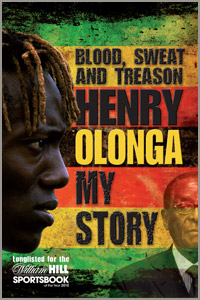Henry Olonga was Zimbabwe’s first black cricketer ever and the youngest ever player at 18 years and 212 days to represent his country at the international level - in a Test match against Pakistan at Harare on January 31, 1995.
Blood, Sweat and Treason tells the story of Olonga's childhood, of his gradual realisation that he was living in a country ruled by a dictator, of his battle to reach the top as a black cricketer, and ultimately, how he sacrificed that position to do something that he hoped would make a difference.
Henry Olonga puts his life at risk, but he got the chance to make a new life in England. In this incredible book, he tells his extraordinary story in pin-point detail, leaving nothing to the imagination.
Henry Blofeld, in his Foreword, says: My own involvement with Olonga began shortly afterwards when he joined the Test Match Special commentary team for the series aainst Zimbabwe. I immediately found out that Olonga was not only a man of great and unchanging principle, but also a man with a splendid sense of humour - and does anything do more to help you through moments of severe personal crisis more than a sense of humour? - huge common sense, a beguiling and attractive way with words and a great knowledge of the game of cricket. He was that rare thing: a balanced human being."
Henry Blofeld further says: "This is a book which must be read. It tells an extraordinary story about one man's beliefs and how he has acted upon them in a way which should be an inspiration to all of us."
Henry Olonga's autobiography is quite refreshing when compared with those of his contemporaries. He has a life story that's worth reading. Zimbabwean cricket enthusiasts remember Olonga for three important issues: being called for throwing on debut. "He was no-balled for throwing, by umpire Robinson - the first recognised bowler to be called in a Test since Ian Meckiff for Australia against South Africa in Brisbane in 1963-64," according to Wisden Cricketers' Almanack.
Zimbabwe won a thrilling match of see-saw battle by three runs against India as they produced the first upset of the 1999 World Cup, thanks to Olonga picking up three wickets (Robin Singh, Javagal Srinath and Venkatesh Prasad) in an over.
On February 10, 2003, Henry Olonga and Andy Flower played a World Cup match wearing black armbands to mourn the ‘death of democracy’ in Zimbabwe. The protest made headlines across the world but within days Olonga discovered that his telephone was being tapped and he was being followed by the secret police. "I'd been really energised. Over a number of years I had come to know the full extent of Mugabe's atrocities against the Zimbabwean people and to finally take a stand against him had been the biggest challenge of my life. But now I was really concerned, even a little scared.
"I knew what could happen to people who crossed Mugabe. I knew that he and his henchmen were alleged to be responsible for the torture, rape and murder of hundreds and thousands of my countrymen. I felt I could be carted away at any minute and never be seen again. I knew there were rumours that people had quite literally disappeared by being thrown into baths of sulphuric acid. Maybe I would just be imprisoned. But Zimbabwean prisons are amongst the worst in the world."
Forced out of Zimbabwe by the circumstances, Olonga now lives in exile in England and has embarked on a career in music and art.
This excellent book is Olonga's story and traces why he gave up his position as an international sportsman to pursue what he believed in.
Sustained by his faith, Henry Olonga, together with his Australian wife, Tara, found his way again. This is perhaps the least known part of Olonga's story, and the more interesting. |

